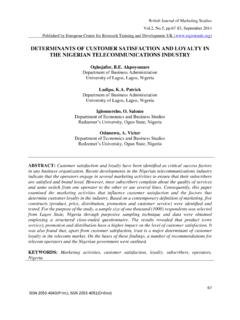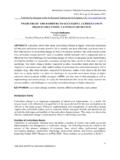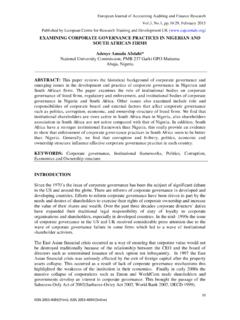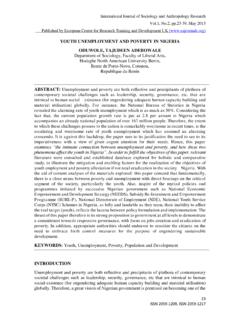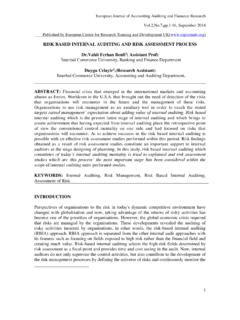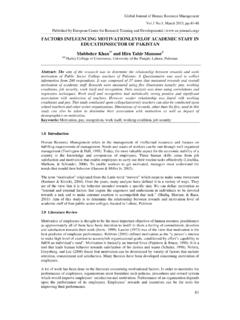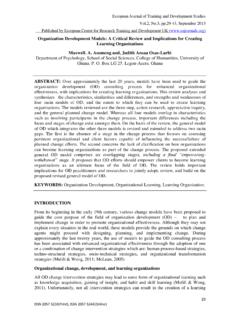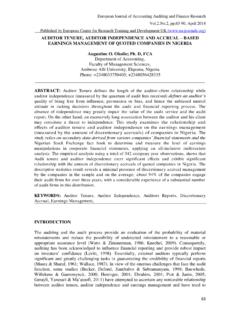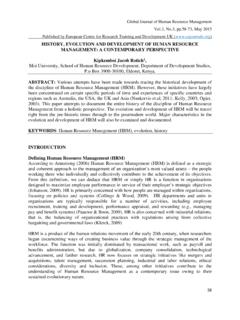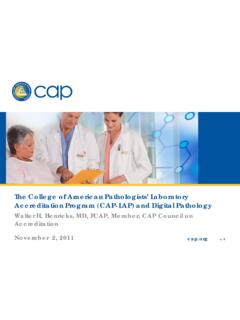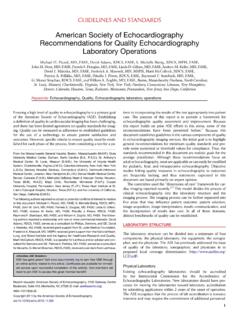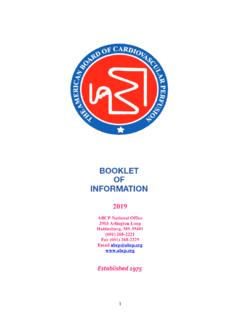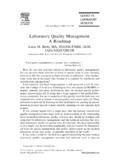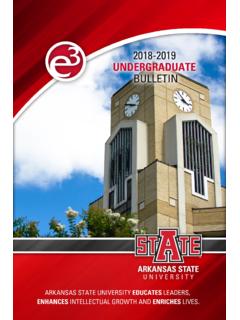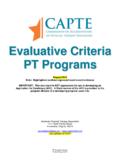Transcription of LABORATORY QUALITY MANAGEMENT SYSTEM FOR A …
1 European Journal of Logistics, Purchasing and Supply Chain MANAGEMENT , , , February 2016 ___Published by European Centre for Research Training and Development UK ( ) 19 ISSN 2054-0930 (Print), ISSN 2054-0949 (Online) LABORATORY QUALITY MANAGEMENT SYSTEM FOR A MEDICAL TESTING AND DIAGNOSTIC LABORATORY : A REVIEW OF AN AVENUE TO ACCREDITATION AND BEYOND Kumurya A. S*, Gwarzo , Ahmad and Halliru Department of Medical LABORATORY Science, Faculty of Allied Health Sciences, Bayero University, 3011, Kano-NIGERIA. ABSTRACT: This review attempts to clarify the concepts of LABORATORY QUALITY MANAGEMENT SYSTEM (Lab QMS) for a medical testing and diagnostic LABORATORY in a holistic way and hopes to expand the horizon beyond QUALITY control (QC) and QUALITY assurance. It provides an insight on accreditation bodies and highlights a glimpse of existing LABORATORY practices but essentially it takes the reader through the journey of accreditation and during the course of reading and understanding this document, prepares the LABORATORY for the same.
2 Some of the areas highlighted include: requirement for accreditation consultants, LABORATORY infrastructure and scope, applying for accreditation, document preparation. This paper is well supported with details like preparation of a standard operating procedure and a QUALITY manual. Concept of training and privileging of staff has been clarified and a few of the QC exercises have been dealt with in a novel way. Finally, a practical advice for facing an actual third party assessment and caution needed to prevent post-assessment pitfalls has been dealt with. KEYWORDS: Accreditation, LABORATORY QUALITY MANAGEMENT SYSTEM INTRODUCTION LABORATORY QUALITY MANAGEMENT SYSTEM (Lab QMS) has evolved through several phases in western countries in the past 40 years and has been comprehensively assessed previously [1] but this aspect has not received its full credit in Nigeria, till now.
3 This in itself shows the existing need to excite an interest and invite a debate on this vital topic. Among the existing work, review by Arora[2] on QUALITY assurance (QA) and Basu et al [3] on QUALITY control (QC) of culture media are very informative but undoubtedly the most exhilarating piece in terms of what exactly was required to bring in the concept of QUALITY was written way back in 1992 by Rao.[4] Information about accreditation process is available through Medical LABORATORY Science Council of Nigeria (MLSCN) and SLIPTA documents, which are extremely well written, but these documents make a dry reading and are theoretical. Hence, the current endeavour is to explain the whole process in an easy to follow practical way. The road map to article is as follows: accreditation bodies, need for accreditation, existing practices in different laboratories, do it yourself or hire consultants?
4 , applying for accreditation, QUALITY plan and preparation of documents, QUALITY SYSTEM procedures (QSPs), QUALITY manual, internal QC in examination procedures, facing accreditation some practical tips and post-assessment pitfall and conclusions. European Journal of Logistics, Purchasing and Supply Chain MANAGEMENT , , , February 2016 ___Published by European Centre for Research Training and Development UK ( ) 20 ISSN 2054-0930 (Print), ISSN 2054-0949 (Online) Accreditation Bodies An accreditation body is a statutory organization that is usually established by an act of parliament and is internationally recognized through "Mutual Recognition Arrangement" An accreditation body promotes development and maintenance of good practices in testing and calibration, technical requirements and competence, establishes and maintains international recognition for its national programs.
5 Global level International Organization for Standardization (ISO) is a worldwide federation of national standards body which was conceived in 1947 (in the form of NATA: National Association of Testing and Accreditation of Laboratories); at present it comprises 140 members with at least one member in each country. ISO publishes its guidelines as International Standards. [5] The International LABORATORY Accreditation Cooperation (ILAC) and the International Accreditation Forum (IAF) deal specifically with laboratories. [6] The ILAC delegates the broad tasks via ISO standards to regional bodies like Asia Pacific LABORATORY Accreditation Cooperation (APLAC) for Asian countries. To make these guidelines acceptable globally and to draw a uniformity all over the globe, there is a memorandum of understanding (MOU) quoting complete recognition and agreement among two international accreditation bodies (ILACandIAF)andISO(MRA).
6 National Level The Medical LABORATORY Science Council of Nigeria (MLSCN) in Nigeria is the National Accreditation Board for Testing and Calibration of Medical Laboratories registered under the Act 11 of 2003. It is the sole authorized Medical LABORATORY accreditation body in Nigeria. Its objective is to provide third party assessment of QUALITY and technical competence. LABORATORY accreditation: A step further than QUALITY assurance and QUALITY control Accreditation is a procedure by which an accreditation body (like MLSCN) gives formal recognition that a body ( LABORATORY ) or person (signatory authority) is competent to carry out specific tasks (scope). [7] The procedure imparts official credit, authorization and registration of a LABORATORY and that it has demonstrated its capability, competence and credibility to carry out its specified scope. [8] It is a philosophy of principles and a voluntary process including a wide array of QUALITY tasks beyond QA and QC.
7 Advantages of accreditation include the following. [9] Reports are accepted internationally implying the concept "Once Tested, Accepted everywhere." Overseas business is improved. QUALITY of reports is not affected by individuals once the systems are in place. User confidence increases. Productivity increases as error and wastage decrease. Need for Accreditation We all know that by running a successful QA program we can deliver reliable reports in an agreed upon time frame and hence achieve customer (which may be the physician or the patient) satisfaction; and once we systematize this process, the SYSTEM can be assessed, European Journal of Logistics, Purchasing and Supply Chain MANAGEMENT , , , February 2016 ___Published by European Centre for Research Training and Development UK ( ) 21 ISSN 2054-0930 (Print), ISSN 2054-0949 (Online) evaluated and improved upon which is comprehensively called the Lab QMS.
8 Accreditation re-enforces and reassures QUALITY by creating an opportunity for the LABORATORY to look back upon the pitfalls which eventually creep into the SYSTEM as soon as we take our eyes off it. National level guidelines for good LABORATORY practice, issued by Medical LABORATORY Science Council of Nigeria (MLSCN) have existed since long, [10] but poor response from the laboratories has led to making of a new directive wherein accreditation is a must-have for CGHS empanelment benefits; [11],[12,17] and this has served as the biggest driving force for the private laboratories to opt for accreditation. Nevertheless, initiatives taken and efforts put in by the laboratories undergoing accreditation have been lauded by the government. [13, 17] Existing Practices in Different Laboratories Laboratories may be divided into two broad categories: first those which are run by government organizations among which a few are attached to medical colleges and second are the private sector laboratories wherein again we find a divergence: (a) the class-apart independent laboratories run by big corporate giants or the in-house laboratories of private/corporate hospitals/clinics and; (b) many small scale run-of-mill laboratories which do not even have the basic LABORATORY structure for doing Medical LABORATORY tests.
9 If we talk about government organizations, then those which are not associated with teaching/CME programs are the least followers of the painstaking path which QUALITY is. On the other hand, laboratories associated with teaching hospitals, which shape up the coming generations of Medical LABORATORY Scientists, are enigmatic because of the presence of iconic Medical LABORATORY Scientists who may not strictly follow the Medical LABORATORY Science Council of Nigeria guidelines. Their experience makes this science look like an art as they avoid those traps which are circumvented through Lab QMS, but this makes the SYSTEM persondependent. If we discuss the lacunae which exist in an un-accredited LABORATORY they would be many and would vary with each LABORATORY , so instead we would like to refer to the article by Rao which quotes "Most of the medical colleges, Medical Laboratories are in poor state due to lack of funds, shortage of staff, etc.
10 The responsibility for this sorry state of affairs, we should admit, is partly ours". [4] This reference reviewed most of Lab QMS in six advises which we would like to state with reference to the existing state of affairs and see where we have come since 1990s. "Reference manuals ( QUALITY documents in current parlance) should be prepared": Most non-accredited laboratories either lack or have poorly prepared documents not in accordance with ISO 15189:2007. "National type collection centre on the lines of American Type Culture Collection (ATCC) should be there": This issue has largely been resolved as one can now easily procure ATCC strains. " QUALITY check on production companies (media, disc etc)": although many agencies have come up as custodians responsible for upholding QUALITY but now it is within easy reach to check the QUALITY of these products at our own laboratories.
